As we wait to see if the cholera epidemic is indeed going to reach Port-au-Prince, I have readjusted my life schedule and am devoting myself to Cholera Prevention Education. Since the disease has no real cure and can spread to large numbers of people very quickly, it is essential that the people understand what the illness is, how they can be infected, how to protect themselves, and how to treat it.
Over the weekend, I taught at St Joseph's, Dorothy's, the youth group, a church in my neighborhood, and 4 tent cities, including the one here on my street. This morning, I spoke to 16 different classrooms at the largest elementary and high school in my area (close to 500 students) and in the afternoon, I spoke to 300 students at the second largest school. I have appointments tomorrow with 2 other schools and another large tent city and my clinic assistant Lucson is going to start teaching in the Delmas 24 area tomorrow also. In a city as populous as Port-au-Prince, the number of people that we can personally teach is minute, but if my audiences do as I'm asking and spread the word, we could have a very positive impact on our communities.
People are extremely receptive because they are fearful. However, overall, the panic level seems to have dropped a bit since Saturday when I first started teaching. Perhaps people are feeling better prepared or perhaps the slowing death rates in the Artibonite region have offered some reassurement. There have been 5 reported cases of cholera in Port-au-Prince, but they were all individuals who left the affected area before becoming ill. So far, as far as we know, no new cases that did not originate in Artibonite have been identified in the capital.
My boss arrives tomorrow afternoon with rehydration salts, IV solutions, gloves, hand sanitizer and some medications that may accelerate recovery. Most of my NGO friends are, like me, doing a lot of teaching, but life for most people, is simply continuing as always while we wait. Will it hit or will it not?
Keep the prayer support coming. I firmly believe that it is only the hand of God that can keep this illness from ravaging our city.
Monday, October 25, 2010
Friday, October 22, 2010
Cholera
An outbreak of cholera has started in and around St Marc, a small city about 2 hours north of Port-au-Prince, along the coastal route to Gonaives. My collegue, Dr Joey Prosper, a Haitian physician, has been there for the past 2 days, helping to treat the 1000+ affected. He said that over a hundred people have died in 48 hours.
Don't panic.
Cholera is a disease that causes excessive diarrhea and sometimes vomiting as well. It is spread from feces to water and food, and thereby can affect large numbers of people very quickly, especially by contaminating a town's water source. Cholera's greatest danger is severe dehydration due to loss of fluids.
Don't panic.
The treatment is quite simple: rehydrate. Lots of fluids, rehydration salts, IV fluids in the more severe cases. Some drugs such as cipro, azithromycin, bactrim and erythromycin can help shorten the disease duration, but the most important actions are preventative: lots of hand washing, cleaning food, boiling or using treated water for drinking and cooking, careful disposal of human waste, and keeping healthy people away from those affected. In other words, we need to do a series of simple things that are going to be virtually impossible to do in the tent cities of Port-au-Prince.
Don't panic. But do pray. Please pray that the outbreak is contained before it ever reaches the capital. Because if it reaches the capital...
Don't panic.
Don't panic.
Cholera is a disease that causes excessive diarrhea and sometimes vomiting as well. It is spread from feces to water and food, and thereby can affect large numbers of people very quickly, especially by contaminating a town's water source. Cholera's greatest danger is severe dehydration due to loss of fluids.
Don't panic.
The treatment is quite simple: rehydrate. Lots of fluids, rehydration salts, IV fluids in the more severe cases. Some drugs such as cipro, azithromycin, bactrim and erythromycin can help shorten the disease duration, but the most important actions are preventative: lots of hand washing, cleaning food, boiling or using treated water for drinking and cooking, careful disposal of human waste, and keeping healthy people away from those affected. In other words, we need to do a series of simple things that are going to be virtually impossible to do in the tent cities of Port-au-Prince.
Don't panic. But do pray. Please pray that the outbreak is contained before it ever reaches the capital. Because if it reaches the capital...
Don't panic.
Thursday, October 21, 2010
Lost and found
Miscardet, one of the boys from HFC, the orphanage where I lived when I first moved to Haiti, holds a special place in my heart because he was so hard to win over. Unlike many of the other children, he was never one to bond easily with visitors or interns, and he rarely spoke about anything serious with us. In the months that I spent at HFC, though he and I did become comfortable enough with each other to tickle, tease, and play tag, I remember only two clear instances when he let his true emotions show. Once, he cried when I was praying for him, and another time, he told me that he hated me. Knowing Miscardet, a child who was nicknamed Master Negative by the other boys, I understood that he was trying to say "I love you."
Two weeks before the earthquake, Miscardet, 17 years old at the time, was kicked out of the orphanage along with 2 other boys. He was supposed to go to a relative in another city, but I never knew if he actually went or if he was just living in the street somewhere. And then the earthquake hit. We heard that the other two boys were alive, but I heard nothing about Miscardet. As months passed and there was still no news, I began to assume that he had not survived.
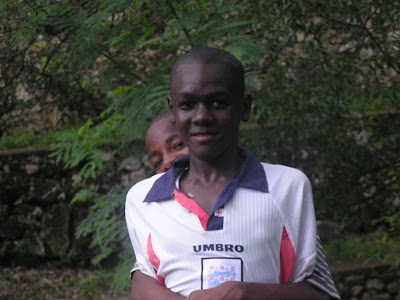
Last week, one of the boys emailed me: "Keziah, they found Miscardet. He is alive and they are letting him come back to the orphanage."
Oh, my happy heart!
Two weeks before the earthquake, Miscardet, 17 years old at the time, was kicked out of the orphanage along with 2 other boys. He was supposed to go to a relative in another city, but I never knew if he actually went or if he was just living in the street somewhere. And then the earthquake hit. We heard that the other two boys were alive, but I heard nothing about Miscardet. As months passed and there was still no news, I began to assume that he had not survived.
Last week, one of the boys emailed me: "Keziah, they found Miscardet. He is alive and they are letting him come back to the orphanage."
Oh, my happy heart!
Tuesday, October 19, 2010
Delmas 91 on probation
The kids on Delmas 91 and I have a good old time together. I cannot leave my house or come home without them knowing, so they are always crowding my door, begging to be allowed to come in to play. If I let them, they would happily live with me 24/7. We do things like...
Puzzles, but only the easy ones. We haven't graduated to puzzles with more than 60 pieces yet.
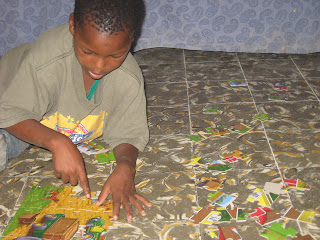
Artwork, with paint, stickers, glue, glitter, markers, crayons, whatever Kez has on hand and will make her Shoebox very messy!

Fruit parties with all the fruit that my patients give me as "Thank you" gifts
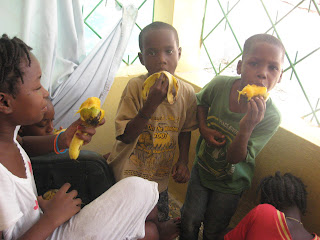
Spring cleaning...which can happen anytime, spring or not, whenever the kids feel like doing something nice for Kez. Sometimes we all clean together for an hour - after which, I kick them out and reclean for another hour.

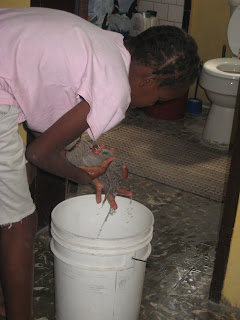
Hot dog dinners, a real treat for Haitian kids!

Dance parties and DJ sessions, to our favorite songs, 'Replay' and 'Feliz Navidad'!

Creative worlds of our own, built out of broken ceramics and rocks from the rubble pile outside.

Go-cart races in cardboard boxes - races that inevitably end with all of us in a heap on the floor laughing.

In all the hours together, the children have never stolen a thing from my house, though my purse is hanging right on the wall in my room and I always keep a few Haitian dollars loose in my sock drawer. They have never stolen food or toys or anything as far as I know. Until this Saturday.
The kids played with me for about 2 1/2 hours at my house and then I sent them away so I could rest before leaving for youth group. A timid knock on my door revealed 5 year old Herlens: "One of the kids took some Silly Bands, Kez." I checked my drawer of treasures and sure enough, I was short 4 packs of Silly Bands. So I walked up to the tent city and told the kids how disappointed I was. No one would confess, so I put them all on probation. When the culprit comes to me and apologizes, everyone will be allowed back into my house, but until then, no child can come play with me. I have a decent idea of who the guilty party is, confirmed by the fact that over the course of the week, all the children have spent time chatting with me through my gate except for this one. He has practically vanished.
It's just Silly Bands, but I'm much more concerned with the attitude behind it than the actual misbehavior itself. I want these children to understand that there is a right and a wrong, and no matter how small it may seem, a wrong is still wrong. So for now, probation it is. My dilemma, however, is what to do if he never confesses...
Puzzles, but only the easy ones. We haven't graduated to puzzles with more than 60 pieces yet.
Artwork, with paint, stickers, glue, glitter, markers, crayons, whatever Kez has on hand and will make her Shoebox very messy!
Fruit parties with all the fruit that my patients give me as "Thank you" gifts
Spring cleaning...which can happen anytime, spring or not, whenever the kids feel like doing something nice for Kez. Sometimes we all clean together for an hour - after which, I kick them out and reclean for another hour.
Hot dog dinners, a real treat for Haitian kids!
Dance parties and DJ sessions, to our favorite songs, 'Replay' and 'Feliz Navidad'!
Creative worlds of our own, built out of broken ceramics and rocks from the rubble pile outside.
Go-cart races in cardboard boxes - races that inevitably end with all of us in a heap on the floor laughing.
In all the hours together, the children have never stolen a thing from my house, though my purse is hanging right on the wall in my room and I always keep a few Haitian dollars loose in my sock drawer. They have never stolen food or toys or anything as far as I know. Until this Saturday.
The kids played with me for about 2 1/2 hours at my house and then I sent them away so I could rest before leaving for youth group. A timid knock on my door revealed 5 year old Herlens: "One of the kids took some Silly Bands, Kez." I checked my drawer of treasures and sure enough, I was short 4 packs of Silly Bands. So I walked up to the tent city and told the kids how disappointed I was. No one would confess, so I put them all on probation. When the culprit comes to me and apologizes, everyone will be allowed back into my house, but until then, no child can come play with me. I have a decent idea of who the guilty party is, confirmed by the fact that over the course of the week, all the children have spent time chatting with me through my gate except for this one. He has practically vanished.
It's just Silly Bands, but I'm much more concerned with the attitude behind it than the actual misbehavior itself. I want these children to understand that there is a right and a wrong, and no matter how small it may seem, a wrong is still wrong. So for now, probation it is. My dilemma, however, is what to do if he never confesses...
Sunday, October 17, 2010
Visit to Gonaives

It was just a quick visit, mostly to introduce Dorothy, our new friend Katie, and Kervens' sponsor to the city of Gonaives. Kervens had been the oldest child at Dorothy's for years but he has been living in Gonaives since shortly after the earthquake and we miss him! We wanted to see him and as a bonus, give Dorothy's new car a chance to drive above 20mph. Here's a little taste of the scenery in the city and on the way there.





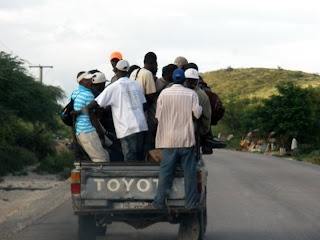
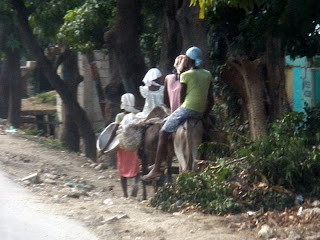


Monday, October 11, 2010
Designated driver
I learned how to drive a stick-shift 6 years ago when I was living in Belgium. I never got entirely confident but I drove on the pedicured roads of Brussels. The thought of driving a manual car in Haiti, however, terrified me. Imagine maneuvering the wild pot hole-filled streets, avoiding pedestrians, chickens, pigs, goats, taptaps and moto-taxis while managing a stick-shift. Not to mention, Port-au-Prince is entirely hills, most of which are plugged with nose-to-nose traffic - rather challenging to the rookie manual driver!
Clearly, I am being forced to overcome my fears. I was invited on a trip to Gonaives this weekend, as a sort of guide, since I have been there often and know the route. My friend Dorothy does not love driving, so I knew that I would probably be called upon to drive a portion of the way in her new stick-shift, but I did not realize that actually, I was there as the designated driver.
Seven hours of Haiti roads later, I had taken us all the way to Gonaives and all the way back without incident. Fear gone; I'll drive anywhere now.
Click here to experience our entertaining drive ... I think I may have a career in ATVs ahead of me!
Clearly, I am being forced to overcome my fears. I was invited on a trip to Gonaives this weekend, as a sort of guide, since I have been there often and know the route. My friend Dorothy does not love driving, so I knew that I would probably be called upon to drive a portion of the way in her new stick-shift, but I did not realize that actually, I was there as the designated driver.
Seven hours of Haiti roads later, I had taken us all the way to Gonaives and all the way back without incident. Fear gone; I'll drive anywhere now.
Click here to experience our entertaining drive ... I think I may have a career in ATVs ahead of me!
Saturday, October 9, 2010
21 Stones
Last week, I worked with a group from the US called 21 Stones led by Pam Peoples and her husband Owen who I met last spring when they were visiting an orphanage in Delmas 75. They began planning with me during the summer to return with water filtration systems to distribute to families I take care of in the ravine and around Delmas 24. I was nervous - anytime a group of 13 foreigners is giving things away there is very high potential for rioting and violence or at the very least, a lot of resentment towards me and my staff for not having enough for absolutely everyone in the city!
During the week prior, I sent Lucson and Wesnal out with 90 little cards. They gave the cards to the families we treat most often and to other families that they know are particularly needy. Then on the first day, we worked inside the clinic at Delmas 24. Everything went like clockwork; in fact, things were so under control that I actually admitted a few additional people to receive the extra filters, something I would normally avoid at all costs for security reasons.



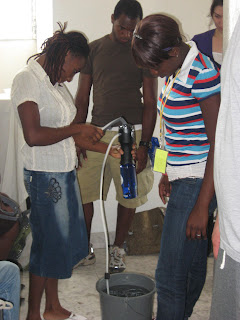

The second day, we trained and distributed in the ravine on Delmas 31. I had tried to rent the large warehouse where we did food distribution last year, but the caretaker wanted an exorbitant amount so we settled on the tarp-covered area in a corner of a tent city. At Delmas 24, we controlled the crowd effortlessly because we were inside a building working behind closed doors. Here though, there was no obvious barrier between the Americans, the people chosen to receive water filters and those who would not receive. I had 4 of my Delmas 24 staff as bodyguards and "bouncers" but I was still a little anxious when we arrived.





Remarkably, the training and distribution went seamlessly. We roped off the area and easily kept spectators outside the rope while we admitted small groups of recipients. The visitors would train 4 or 5 Haitians at a time how to use the hand pump filter system, they would make each person demonstrate the technique and then they would all, American and Haitian alike, drink the filtered water. I have tried since the earthquake to get the people in my neighborhood to drink filtered water but they have refused so I was thrilled to see group after group cheerfully drinking the water! And unlike last spring when over 300 people rioted during the food distribution, only one person got boisterous. Everyone else made gentle reproaches ("Why don't you have one for me?" "Can't the Americans give us food too?" "You should bring more next time, Kez!") or merely watched intently.

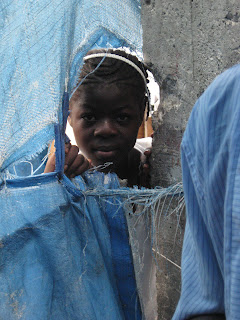
In addition to my usual translators, Sendhie and Josilien, three of my youth group kids joined us as translators. Ruth, Junior and Anthony have been at youth group longer than I have and they are part of what we call "the core", a sub group of about 20 teens that is sincerely serious about growing in their faith. They did a great job translating for us. I wish they didn't have to go to school so I could use them more often.

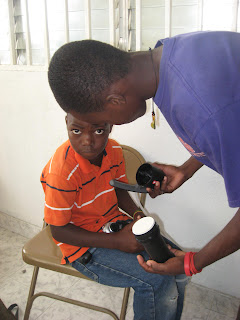
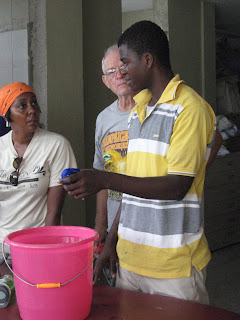
What could have been a scary and overwhelming few days instead was a very effective and helpful experience. I have already heard from several families that they are using the pumps regularly, and we are all looking forward to 21 Stones' next visit to Haiti.
During the week prior, I sent Lucson and Wesnal out with 90 little cards. They gave the cards to the families we treat most often and to other families that they know are particularly needy. Then on the first day, we worked inside the clinic at Delmas 24. Everything went like clockwork; in fact, things were so under control that I actually admitted a few additional people to receive the extra filters, something I would normally avoid at all costs for security reasons.
The second day, we trained and distributed in the ravine on Delmas 31. I had tried to rent the large warehouse where we did food distribution last year, but the caretaker wanted an exorbitant amount so we settled on the tarp-covered area in a corner of a tent city. At Delmas 24, we controlled the crowd effortlessly because we were inside a building working behind closed doors. Here though, there was no obvious barrier between the Americans, the people chosen to receive water filters and those who would not receive. I had 4 of my Delmas 24 staff as bodyguards and "bouncers" but I was still a little anxious when we arrived.
Remarkably, the training and distribution went seamlessly. We roped off the area and easily kept spectators outside the rope while we admitted small groups of recipients. The visitors would train 4 or 5 Haitians at a time how to use the hand pump filter system, they would make each person demonstrate the technique and then they would all, American and Haitian alike, drink the filtered water. I have tried since the earthquake to get the people in my neighborhood to drink filtered water but they have refused so I was thrilled to see group after group cheerfully drinking the water! And unlike last spring when over 300 people rioted during the food distribution, only one person got boisterous. Everyone else made gentle reproaches ("Why don't you have one for me?" "Can't the Americans give us food too?" "You should bring more next time, Kez!") or merely watched intently.
In addition to my usual translators, Sendhie and Josilien, three of my youth group kids joined us as translators. Ruth, Junior and Anthony have been at youth group longer than I have and they are part of what we call "the core", a sub group of about 20 teens that is sincerely serious about growing in their faith. They did a great job translating for us. I wish they didn't have to go to school so I could use them more often.
What could have been a scary and overwhelming few days instead was a very effective and helpful experience. I have already heard from several families that they are using the pumps regularly, and we are all looking forward to 21 Stones' next visit to Haiti.
Wednesday, October 6, 2010
A special day for Johnny J
Monday started quite normally for Johnny J: an onslaught of medications (AIDS meds, vitamins etc)...

...some breakfast...

...adjusting his pants and shirt to fit his skinny arms and legs...

...nannies working on the finishing touches...

...a little walk with Cha-Cha and Kez...
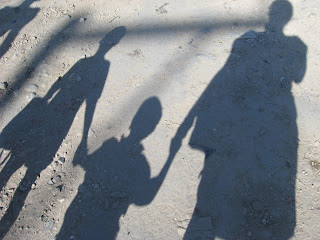
...and the seemingly normal morning ended very unnormally like this!

It was Johnny's first day at school!
He wasn't the only one of Dorothy's kids to go. Mich, Rosa, and Claudine all had their first days of school ever on Monday too. Cha-Cha started last year at an English-speaking school run by our friend and neighbor, Dottie, called TLC Barefoot School (where my roommate Dannae used to teach), so he has already completed a year of school and has been back in class since August. All the Haitian schools open this week or next. With the 3 months of school lost after the earthquake, schools ran through most of the summer, so the government called for a later school opening date to allow time for national exams durin the vacation.



I got to meet Johnny's teacher and explain to her a little about his living situation and about his hearing and speech problems due to his recurrent ear infections. I did not tell her that he is HIV positive; there is far too much stigma attached to that diagnosis. Hopefully she will be patient with him and hopefully he won't be too shy to speak. All in all, he was a real trooper and didn't even whimper when I said good-bye and walked out. I am so proud of my little boy!

...some breakfast...
...adjusting his pants and shirt to fit his skinny arms and legs...
...nannies working on the finishing touches...
...a little walk with Cha-Cha and Kez...
...and the seemingly normal morning ended very unnormally like this!
It was Johnny's first day at school!
He wasn't the only one of Dorothy's kids to go. Mich, Rosa, and Claudine all had their first days of school ever on Monday too. Cha-Cha started last year at an English-speaking school run by our friend and neighbor, Dottie, called TLC Barefoot School (where my roommate Dannae used to teach), so he has already completed a year of school and has been back in class since August. All the Haitian schools open this week or next. With the 3 months of school lost after the earthquake, schools ran through most of the summer, so the government called for a later school opening date to allow time for national exams durin the vacation.
I got to meet Johnny's teacher and explain to her a little about his living situation and about his hearing and speech problems due to his recurrent ear infections. I did not tell her that he is HIV positive; there is far too much stigma attached to that diagnosis. Hopefully she will be patient with him and hopefully he won't be too shy to speak. All in all, he was a real trooper and didn't even whimper when I said good-bye and walked out. I am so proud of my little boy!
Friday, October 1, 2010
Where Keziah has been, Part 5: Everything else
And then there's everything else.
Visits from medical visa patients, both those who have been to the US and returned to Haiti and those who are waiting to go.

Visits from families who need school sponsorships for their children.
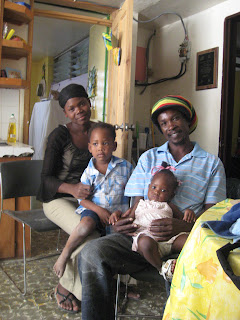
Arrangements to get more advanced care for Bergine, the poor 20 year old with that horrid skin condition in the ravine. He is currently at Dr Joey's hospital on Delmas 33 but I am going to try to move him to the Miami University Hospital team that has taken over a hospital off Route de l'Aeroport.

Last week, we finally made a little breakthrough with the medical visas we've been waiting for. Sebastien, a little boy with hypospadius (a penile problem), got his passport so we have scrambled to get his final documents and will file for his visa next week. Vanessa, a 15 year old with severe heart condition, got her final paperwork from the US, so I took her and her father into the Embassy this week and got her visa. She will fly out on Saturday and have surgery on Monday.
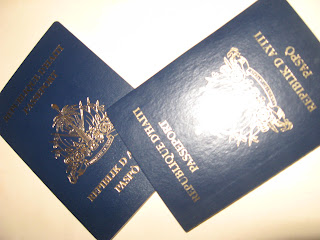

Meanwhile, I got called on to substitute teach part-time for a friend of mine at Quisqueya Christian School. I would get up early, see patients, do visa paperwork, arrange things for my houseguests, and then hurry to school. Teach for a few hours, meet with students one-on-one for a few hours, and then go home or to clinic to work some more. As always, it's very odd to leave my world of dirt poor needy people and surround myself by the wealthy students at QCS, but I am so grateful for the opportunity. I know many of the upper classmen from the substitute teaching I did in 2008, but nearly all of them evacuated after the earthquake, so I haven't seen or spoken to them in months. It was a pleasure to be with them again and to hear their stories.
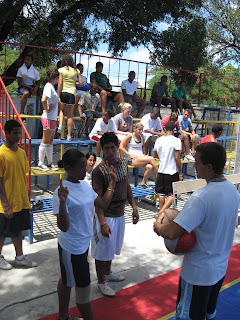

And of course, the usual medical care, at clinic and at my Shoebox where neighbors and workmen show up with back pain, heartburn, infections, wounds that need cleaning, and high blood pressure. It's a funny cycle - when I get busy, I have less time at home so when I am at home my neighbors crowd me complaining that they never see me, which just makes me busier thereby making it even harder for me to get up to the tent city to see them. It tires me, but I love having that relationship with them and being able to serve my community in some way.
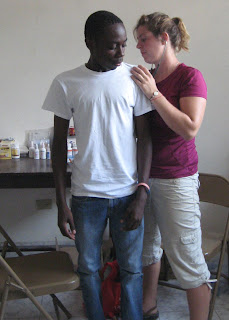


Visits from medical visa patients, both those who have been to the US and returned to Haiti and those who are waiting to go.
Visits from families who need school sponsorships for their children.
Arrangements to get more advanced care for Bergine, the poor 20 year old with that horrid skin condition in the ravine. He is currently at Dr Joey's hospital on Delmas 33 but I am going to try to move him to the Miami University Hospital team that has taken over a hospital off Route de l'Aeroport.
Last week, we finally made a little breakthrough with the medical visas we've been waiting for. Sebastien, a little boy with hypospadius (a penile problem), got his passport so we have scrambled to get his final documents and will file for his visa next week. Vanessa, a 15 year old with severe heart condition, got her final paperwork from the US, so I took her and her father into the Embassy this week and got her visa. She will fly out on Saturday and have surgery on Monday.
Meanwhile, I got called on to substitute teach part-time for a friend of mine at Quisqueya Christian School. I would get up early, see patients, do visa paperwork, arrange things for my houseguests, and then hurry to school. Teach for a few hours, meet with students one-on-one for a few hours, and then go home or to clinic to work some more. As always, it's very odd to leave my world of dirt poor needy people and surround myself by the wealthy students at QCS, but I am so grateful for the opportunity. I know many of the upper classmen from the substitute teaching I did in 2008, but nearly all of them evacuated after the earthquake, so I haven't seen or spoken to them in months. It was a pleasure to be with them again and to hear their stories.
And of course, the usual medical care, at clinic and at my Shoebox where neighbors and workmen show up with back pain, heartburn, infections, wounds that need cleaning, and high blood pressure. It's a funny cycle - when I get busy, I have less time at home so when I am at home my neighbors crowd me complaining that they never see me, which just makes me busier thereby making it even harder for me to get up to the tent city to see them. It tires me, but I love having that relationship with them and being able to serve my community in some way.
Subscribe to:
Posts (Atom)